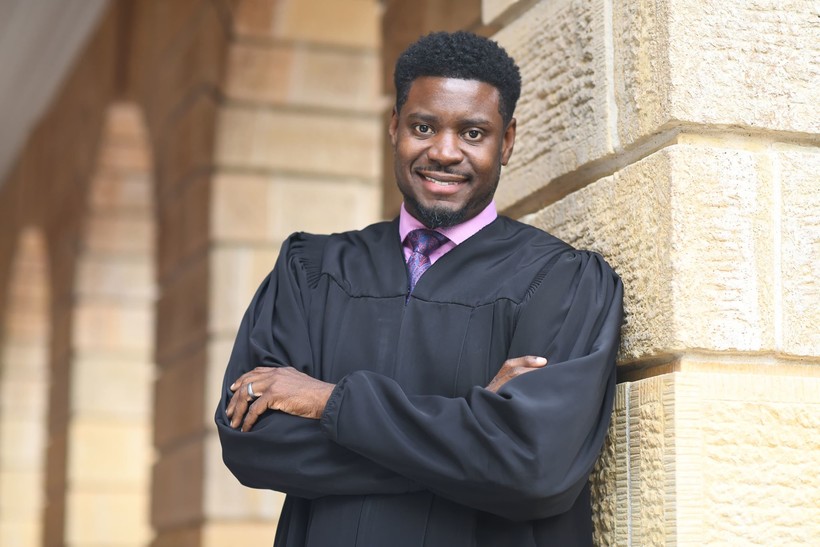Can Everett Mitchell Win High Court Race?
Last in fundraising in state Supreme Court race, Dane County judge says grass roots support is key.

Hon/Rev. Everett Mitchell. Photo courtesy of Everett Mitchell.
Everett Mitchell says that his competency as a judge is never why people say he can’t be elected to the Wisconsin Supreme Court this spring.
Instead, he’s been dogged by questions — and fears from the state’s left wing — about nominating a Black man in a statewide race on the heels of former Lt. Gov. Mandela Barnes’ narrow loss to incumbent Republican Sen. Ron Johnson in November.
“This idea of how race plays into this … this dog whistle among even our liberal communities, our liberal press, we use this dog whistle to make people afraid, to think it’s a risk,” Mitchell, a Dane County Circuit Court judge, tells the Wisconsin Examiner. “No one ever questions my competency, no one ever questions what I’ve done as a judge or my record. They say you should not do it or be afraid to do it because I’m Black — ‘we’re afraid of what the racist ads will look like’ — you shouldn’t be making decisions based on fear, you should be making decisions based on who will be the best judge.”
Mitchell has lagged behind the other three candidates in fundraising and endorsements. He’s the only candidate who is not yet running television ads. The four-way, officially nonpartisan primary in a race that could decide the state’s future on issues such as the right to an abortion and the state’s political maps includes two conservatives, former Supreme Court Justice Daniel Kelly and Waukesha County Judge Jennifer Dorow, and two liberals, Milwaukee County Judge Janet Protasiewicz and Mitchell.
The winner of the April election will take the seat being vacated by retiring conservative Justice Patience Roggensack. With conservatives on the court currently holding a slim 4-3 majority, the result will decide the body’s ideological leaning.
On the liberal side, Protasiewicz enjoys a massive fundraising advantage. In the campaign finance reporting period that ended at the end of last year, Protasiewicz was outraising the field, bringing in $756,117 while spending $185,523. Over the course of 2022, she raised $924,349 and ended the year with $734,962 in the bank.
As the first candidate to enter the race, Protasiewicz had a head start, but in the same six-month reporting period, Mitchell raised $115,689 and spent $71,962.
Despite lagging behind in fundraising, Mitchell says he believes his campaign can get through the February primary and then benefit as progressive voters close ranks around him.
“If money can buy politics and money can buy votes there’d be a lot of rich people in politics right now,” he says, dismissing the idea that his better funded opponent is becoming invincible. “Once we get past the primary, there’d be consolidation,” he adds. “The goal is to lean on those relationships and grassroots relationships.”
Mitchell has won the endorsements of a number of state representatives and a handful of elected officials from the Madison area, as well as the support of former Democratic Gov. Jim Doyle. But the largest endorsements have gone to Protasiewicz, who has been supported by two of the three liberal-leaning justices on the court as well as a larger number of Democratic legislators.
Rep. LaKeshia Myers (D-Milwaukee), who has endorsed Mitchell, says she knows it can be hard for a Black candidate to win traction in a state with a Black population of less than 7%. She noted that the only two Black candidates who have been able to run strong statewide races are Barnes — who became Wisconsin’s first Black lieutenant governor in 2018 and nearly beat Sen. Ron Johnson in a much closer race than Johnson’s two previous match-ups — and Vel Phillips, who was elected Secretary of State in 1978.
But, Myers says, knocking Mitchell because of his race and associating him with Barnes’ loss is “ludicrous.” She points to Mitchell’s various trips to all parts of the state where, she says, he has connected with a wider array of voters.
Myers pushes back on “apprehension about a Black man being able to win in Wisconsin.”
“When you look at the quality of a candidate, that’s where the difference lies. When you look at how the campaign has been engaging with multiple communities within our state. If I were to do an autopsy of the Barnes campaign, I’d say there was not the engagement there should have been. That level of engagement did not happen. That’s where we got the result we got. When you look at a person of Judge Mitchell’s caliber, he’s an excellent candidate.”
In the Senate race last year, Barnes was constantly pestered by ads connecting him to rising crime rates in the Milwaukee area. One ad from an outside group used a filter to make his skin appear darker and others flashed his name over surveillance videos of crimes in progress. After the race, Republicans in the area bragged about their successful efforts to suppress the Black vote in Milwaukee — which ultimately decided the race.
Public safety promises to be a major issue in the Supreme Court race, too, with Dorow running TV ads touting her experience as a prosecutor and her work presiding over the trial of the man who killed six people when he drove his SUV through the Waukesha Christmas parade in 2021.
Mitchell says a campaign based on fear of what the other side will say can’t win. Instead, he says, it’s about connecting with voters.
“We’ve been hearing that since Nov. 5, since Mandela lost, can a Black man win a statewide election?” he says. “I want them to hear the racism in the statement when they say it. It’s only when it’s applied to a person of color is that standard applied. No one has said a woman can’t win a Supreme Court seat. It’s based on this racialized dog whistle. The reality is Mandela and I are two different men. I have a whole series of life experiences.”
Plus, he adds, the reason for Barnes’ loss “wasn’t the racist ads per se; Republicans were bragging about suppressing votes in Milwaukee.”
“We can learn from that rather than just say we can’t win. It’s our job to learn what happened and be proactive and have a message that resonates,” he continues. “Do we have a message on law enforcement and public safety? Yes.”
Mitchell, who is also a pastor, has degrees from Morehouse College, Princeton Theological Seminary and the UW-Madison School of Law. He was elected to the Dane County court in 2016 and re-elected last year. In both races, he ran unopposed.
As a Dane County judge, he’s been responsible for the county’s juvenile court and its high-risk drug court. On the juvenile side, he instituted a number of policies meant to lessen trauma for kids in the system — including removing restraints during hearings. He’s also worked with the Madison school district to improve the education of children in the criminal justice system.
Myers pointed out that he often remains in contact with children who have passed through his courtroom to remain a positive influence on their lives.
“That’s evident in his role on the court in Dane county, what he’s done with the drug court and what he’s done with juveniles,” she says. “Not just look for the harshest penalty but also look to restorative practices to repair and change relationships.”
Even though he’s trailed in fundraising and endorsements, Mitchell says he’s encouraged by the reception his message of increasing fairness in the justice system has been received in rural and urban parts of the state. Mitchell has been highlighting his work in Dane County as he stresses the need to make the state’s courts more just for regular people.
“Whether they’ve been in Republican or Democratic places, they’ve been thoughtful conversations,” he says. “There seems to be two types of races being run right now, one race focuses on voting, reproductive choice, fair maps. A separate conversation is about justice and fairness and how we respond to make Wisconsin a more just place, actually listening to community members.”
Myers says Mitchell’s connection to the community and understanding of how legal decisions affect people’s lives is the trait that best qualifies him to be on the Supreme Court.
“When you look at what the role of the Supreme Court is, interpretation of the law, how their opinions will bode in everyday life,” she says, Mitchell is “not someone 100,000 feet from the ground but [instead is asking] how this legal application will impact people’s lives.”
But, in a primary race ahead of what is expected to be one of the most expensive judicial elections in the country’s history, she says she hopes he gets a fair shot to be heard.
“I hope all Wisconsinites do their due diligence and look at all of the candidates,” she says. “I’m not telling them to do what I’m going to do, which is vote for Judge Mitchell, but I would hope we give him a fighting chance.”
The Supreme Court primary is set for Feb. 21.
Mitchell pushes judicial fairness as he tries to escape Barnes campaign shadow was originally published by Wisconsin Examiner





















The concerns about viability in the Fox Valley and Driftless areas are legitimate after Barnes failed to oust Johnson in the Midterms. I think if the Democratic Party wants long-term viability and to actually be able to chip away at the gerrymandered stranglehold Conservatives have on this state, Progressives in Milwaukee and Dane County, to which I belong, need to finally accept that areas around the state do fall for those race-baiting scare adds conservatives run. It’s not right but it’s reality and we saw it reflected in Barnes’ polling numbers as the conservatives ramped those adds up. Causation has not been established but it looks SUUUUUPER coincidental and if Mitchell gets on the General Ballot it will be a repeat because the people that leaned into those race-baiting ads did not suddenly have their come-to-Jesus moment on racial biases since November 2022.
I agree with Dan’s analysis. Had the black voter turnout in the senatorial race been greater, it’s likely Barnes would have won. That fact is hugely disappointing and causes many committed liberals to be wary of Mitchell’s candidacy given what hangs in the balance.
While Mr. Mitchell’s credentials are impressive, so is the obvious rural /suburban racial bias. Given what hangs in the balance this is not the time to gamble away a ‘must win.’